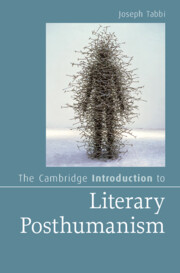Book contents
- The Cambridge Introduction to Literary Posthumanism
- The Cambridge Introduction to Literary Posthumanism
- Copyright page
- Contents
- Illustrations
- Acknowledgments
- Introduction
- Chapter 1 Beyond the Two Cultures?
- Chapter 2 Mary Shelley’s Modern and Shelley Jackson’s Postmodern Prometheus
- Chapter 3 Postperiodization
- Chapter 4 Posthuman Sublime
- Chapter 5 Ah Bartleby, Ah Humanities!
- Chapter 6 The Posthuman Imagination in Contemporary Literature
- Chapter 7 Posthuman Epic in the Era of AI
- Chapter 8 Interlude
- Chapter 9 Digital Posthumanism (On the Periphery)
- Epilogue:
- A Collaborative Glossary of Terms (In Process)
- Works Cited
- Index
- Cambridge Introductions to Literature
Chapter 1 - Beyond the Two Cultures?
Published online by Cambridge University Press: 04 December 2024
- The Cambridge Introduction to Literary Posthumanism
- The Cambridge Introduction to Literary Posthumanism
- Copyright page
- Contents
- Illustrations
- Acknowledgments
- Introduction
- Chapter 1 Beyond the Two Cultures?
- Chapter 2 Mary Shelley’s Modern and Shelley Jackson’s Postmodern Prometheus
- Chapter 3 Postperiodization
- Chapter 4 Posthuman Sublime
- Chapter 5 Ah Bartleby, Ah Humanities!
- Chapter 6 The Posthuman Imagination in Contemporary Literature
- Chapter 7 Posthuman Epic in the Era of AI
- Chapter 8 Interlude
- Chapter 9 Digital Posthumanism (On the Periphery)
- Epilogue:
- A Collaborative Glossary of Terms (In Process)
- Works Cited
- Index
- Cambridge Introductions to Literature
Summary
Here, at the start, I introduce important emphases and divergences within a range of posthuman discourses. Particularly, the distinction between a transhuman empiricism and a reflective, critical posthumanism will be addressed (in this chapter) as a replay of the two-culture noncommunication that C. P. Snow observed (circa 1959) between poets who were deficient in science and scientists who were thought to be “shallowly optimistic, unaware of man’s condition” (Snow, “Two Cultures,” 5). This said, each of the posthumanist listings in the introduction by Latour, Hayles, Wolfe, Barad, Jane Bennett, and Patricia MacCormack offer encouraging signs that cross-disciplinary conversations and articulations are becoming the order of the day in twenty-first-century posthumanist discourse. Our “imbrication” (to again cite Wolfe 2010, xv) of human and nonhuman networking is thrust on us, not a matter of personal choice or subjective preference.
- Type
- Chapter
- Information
- The Cambridge Introduction to Literary Posthumanism , pp. 13 - 27Publisher: Cambridge University PressPrint publication year: 2024

